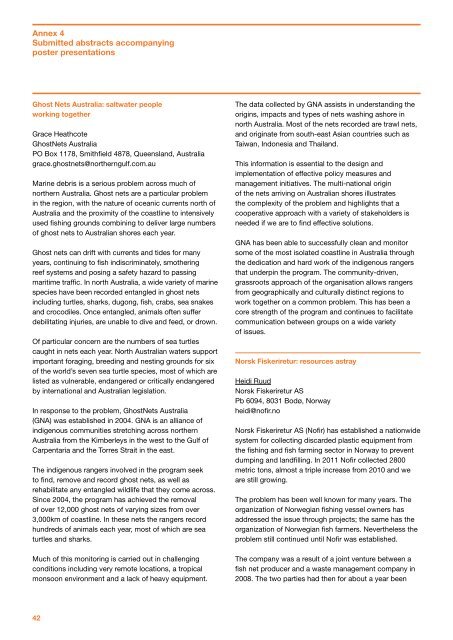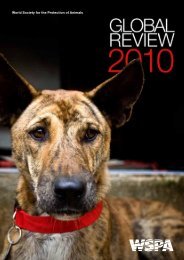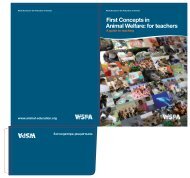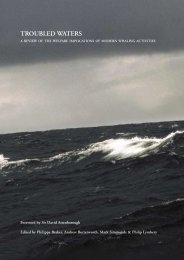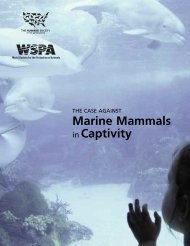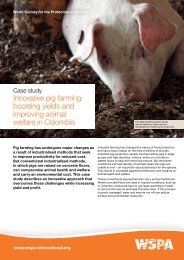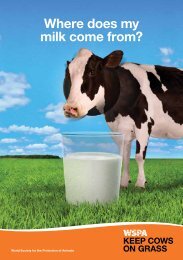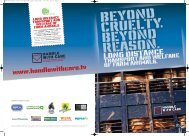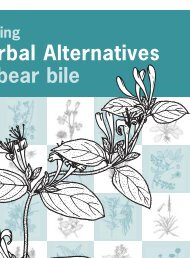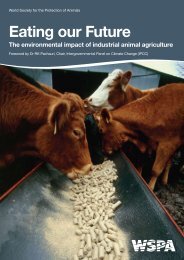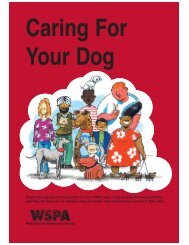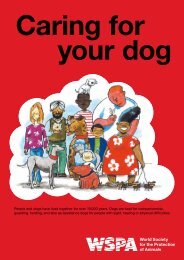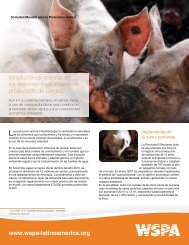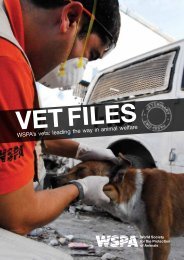Proceedings of the Untangled symposium: - WSPA
Proceedings of the Untangled symposium: - WSPA
Proceedings of the Untangled symposium: - WSPA
Create successful ePaper yourself
Turn your PDF publications into a flip-book with our unique Google optimized e-Paper software.
Annex 4Submitted abstracts accompanyingposter presentationsGhost Nets Australia: saltwater peopleworking toge<strong>the</strong>rGrace HeathcoteGhostNets AustraliaPO Box 1178, Smithfield 4878, Queensland, Australiagrace.ghostnets@nor<strong>the</strong>rngulf.com.auMarine debris is a serious problem across much <strong>of</strong>nor<strong>the</strong>rn Australia. Ghost nets are a particular problemin <strong>the</strong> region, with <strong>the</strong> nature <strong>of</strong> oceanic currents north <strong>of</strong>Australia and <strong>the</strong> proximity <strong>of</strong> <strong>the</strong> coastline to intensivelyused fishing grounds combining to deliver large numbers<strong>of</strong> ghost nets to Australian shores each year.Ghost nets can drift with currents and tides for manyyears, continuing to fish indiscriminately, smo<strong>the</strong>ringreef systems and posing a safety hazard to passingmaritime traffic. In north Australia, a wide variety <strong>of</strong> marinespecies have been recorded entangled in ghost netsincluding turtles, sharks, dugong, fish, crabs, sea snakesand crocodiles. Once entangled, animals <strong>of</strong>ten sufferdebilitating injuries, are unable to dive and feed, or drown.Of particular concern are <strong>the</strong> numbers <strong>of</strong> sea turtlescaught in nets each year. North Australian waters supportimportant foraging, breeding and nesting grounds for six<strong>of</strong> <strong>the</strong> world’s seven sea turtle species, most <strong>of</strong> which arelisted as vulnerable, endangered or critically endangeredby international and Australian legislation.In response to <strong>the</strong> problem, GhostNets Australia(GNA) was established in 2004. GNA is an alliance <strong>of</strong>indigenous communities stretching across nor<strong>the</strong>rnAustralia from <strong>the</strong> Kimberleys in <strong>the</strong> west to <strong>the</strong> Gulf <strong>of</strong>Carpentaria and <strong>the</strong> Torres Strait in <strong>the</strong> east.The indigenous rangers involved in <strong>the</strong> program seekto find, remove and record ghost nets, as well asrehabilitate any entangled wildlife that <strong>the</strong>y come across.Since 2004, <strong>the</strong> program has achieved <strong>the</strong> removal<strong>of</strong> over 12,000 ghost nets <strong>of</strong> varying sizes from over3,000km <strong>of</strong> coastline. In <strong>the</strong>se nets <strong>the</strong> rangers recordhundreds <strong>of</strong> animals each year, most <strong>of</strong> which are seaturtles and sharks.Much <strong>of</strong> this monitoring is carried out in challengingconditions including very remote locations, a tropicalmonsoon environment and a lack <strong>of</strong> heavy equipment.The data collected by GNA assists in understanding <strong>the</strong>origins, impacts and types <strong>of</strong> nets washing ashore innorth Australia. Most <strong>of</strong> <strong>the</strong> nets recorded are trawl nets,and originate from south-east Asian countries such asTaiwan, Indonesia and Thailand.This information is essential to <strong>the</strong> design andimplementation <strong>of</strong> effective policy measures andmanagement initiatives. The multi-national origin<strong>of</strong> <strong>the</strong> nets arriving on Australian shores illustrates<strong>the</strong> complexity <strong>of</strong> <strong>the</strong> problem and highlights that acooperative approach with a variety <strong>of</strong> stakeholders isneeded if we are to find effective solutions.GNA has been able to successfully clean and monitorsome <strong>of</strong> <strong>the</strong> most isolated coastline in Australia through<strong>the</strong> dedication and hard work <strong>of</strong> <strong>the</strong> indigenous rangersthat underpin <strong>the</strong> program. The community-driven,grassroots approach <strong>of</strong> <strong>the</strong> organisation allows rangersfrom geographically and culturally distinct regions towork toge<strong>the</strong>r on a common problem. This has been acore strength <strong>of</strong> <strong>the</strong> program and continues to facilitatecommunication between groups on a wide variety<strong>of</strong> issues.Norsk Fiskeriretur: resources astrayHeidi RuudNorsk Fiskeriretur ASPb 6094, 8031 Bodø, Norwayheidi@n<strong>of</strong>ir.noNorsk Fiskeriretur AS (N<strong>of</strong>ir) has established a nationwidesystem for collecting discarded plastic equipment from<strong>the</strong> fishing and fish farming sector in Norway to preventdumping and landfilling. In 2011 N<strong>of</strong>ir collected 2800metric tons, almost a triple increase from 2010 and weare still growing.The problem has been well known for many years. Theorganization <strong>of</strong> Norwegian fishing vessel owners hasaddressed <strong>the</strong> issue through projects; <strong>the</strong> same has <strong>the</strong>organization <strong>of</strong> Norwegian fish farmers. Never<strong>the</strong>less <strong>the</strong>problem still continued until N<strong>of</strong>ir was established.The company was a result <strong>of</strong> a joint venture between afish net producer and a waste management company in2008. The two parties had <strong>the</strong>n for about a year been42


